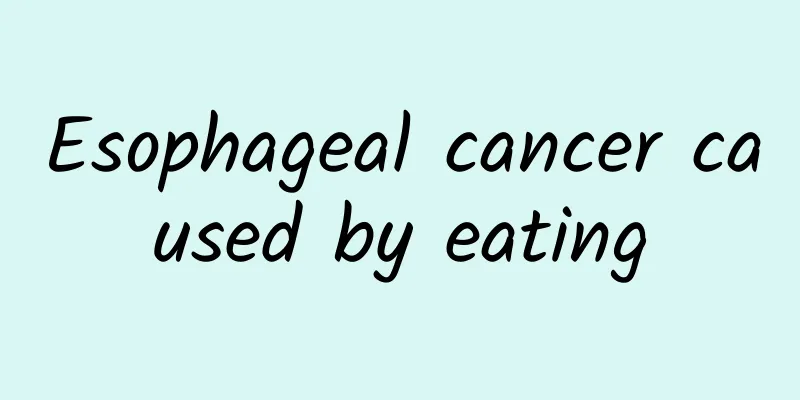Esophageal cancer caused by eating

|
The esophagus is a tubular organ that connects the throat and the stomach. The malignant tumor that grows here is esophageal cancer. Among the causes of death from malignant tumors, esophageal cancer ranks fourth. Many people say that esophageal cancer is caused by "eating". Let's take a look at what's going on. 1. Why does esophageal cancer occur? Genetic genes are innate factors, which determine whether a person is susceptible to esophageal cancer. The intake of nitrites, carcinogenic fungi, and imbalance of trace elements are all important acquired carcinogenic factors. Among them, nitrosamines are relatively common carcinogens, which are widely present in food and daily necessities. For example, tobacco, beer, and pickled foods all contain nitrosamines to varying degrees. The main carcinogenic fungus is Aspergillus flavus. The aflatoxin it produces has been classified as a naturally occurring carcinogen by the World Health Organization's Cancer Research Institute. It is mostly found in spoiled high-starch foods and moldy wooden tableware. There are also more than 70 trace elements such as iron, iodine, zinc, and selenium. Excessive or insufficient amounts will reduce the body's resistance to diseases such as cancer. 2. What are the symptoms of esophageal cancer? The symptoms of esophageal cancer are relatively subtle. In the early stages, they usually manifest as occasional choking when swallowing, slow passage of food, a sense of stagnation or a foreign body attached, and a burning, pricking, or pulling sensation under the xiphoid process behind the sternum. These symptoms can be mild or severe, and sometimes even disappear after eating. However, as the disease worsens, swallowing becomes increasingly difficult, and eventually even water and saliva cannot be swallowed. The patient gradually loses weight, becomes dehydrated, and becomes weak. If chest pain or back pain occurs, it is a late-stage symptom, and then different clinical symptoms will occur depending on the site of cancer cell invasion, such as hoarseness if the recurrent laryngeal nerve is invaded. 3. How to detect esophageal cancer early? The latest "Expert Consensus on Screening for Early Esophageal Cancer and Precancerous Lesions in China" recommends that 40 years old be the starting age for esophageal cancer screening, and that screening be terminated at 75 years old or when life expectancy is less than 5 years. For those who meet the screening age, those who have any of the following risk factors are recommended as the target population for screening: (1) Born or lived for a long time in areas with a high incidence of esophageal cancer. (2) First-degree relatives have a history of esophageal cancer. (3) The individual suffers from esophageal precancerous disease or precancerous lesions. (4) The individual has a history of head and neck tumors. (5) Combination with other high-risk factors for esophageal cancer: hot and scalding food, drinking (≥15g/d), smoking, eating too fast, indoor air pollution, tooth loss, etc. In areas with a very high incidence of esophageal cancer, an endoscopic screening is recommended for the target population every 5 years. For other areas, it is recommended to conduct an initial screening of the target population for esophageal cancer risk stratification, and endoscopic screening for high-risk individuals every 5 years. For low-grade intraepithelial neoplasia (mild and moderate dysplasia) found in the screening, lesions with a diameter greater than 1cm or combined with multiple esophageal cancer risk factors, it is recommended to perform an endoscopic follow-up once a year. Other patients can undergo an endoscopic follow-up every 2-3 years. 4. What are the methods to prevent esophageal cancer? There are currently a variety of treatment options for esophageal cancer that can improve the survival rate of patients, but prevention is still the best treatment. Be wary of foods containing nitrosamines, stay away from moldy foods, do not eat too fast, do not eat hot foods, increase the intake of fresh fruits and vegetables, maintain a balanced diet, develop a good work and rest routine, and enhance immunity, all of which can effectively prevent esophageal cancer. |
<<: Early screening for gastric cancer keeps your stomach healthy
>>: How much do you know about the dreaded hepatitis B?
Recommend
Will my waist ache during early pregnancy?
Pregnancy is something that many women experience...
What causes a fishy vaginal odor?
For friends who have a fishy smell in the vagina,...
Why do I feel weak and dizzy during my period?
Women may experience many physical discomforts du...
Stop! These methods can't shrink pores, but will damage your face. Don't step on the thunder again
Although many people have been dealing with pores...
What causes joint cracking in pregnant women?
Mothers often encounter some troubles and problem...
How long after taking ibuprofen can I breastfeed?
Women cannot take medicines at will during breast...
Is stem cell beauty a black technology or pseudoscience?
Author: Fan Chenyu (Guangzhou Institutes of Biome...
What causes back pain in women?
Low back pain is a symptom. Generally speaking, t...
Want to control blood sugar scientifically? Diabetics just need to read this article!
1. Pay attention to the sugar content of food Usu...
There is a hard lump in the middle of the cleavage
Women must pay more attention to their breast hea...
Why does a woman have a stomachache?
Most women have cold bodies, so in daily life the...
World Mental Health Day | How to prevent and treat mental illness?
How to prevent and treat mental and psychological...
How to regulate high testosterone levels in girls
If the estrogen level in the female body is too h...
Can I do it after my period just ended?
Although many women know when the safe period is,...
Is it OK to sunbathe after giving birth?
Chinese mothers should change their traditional b...









